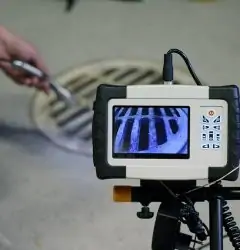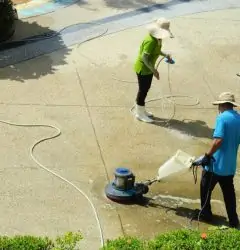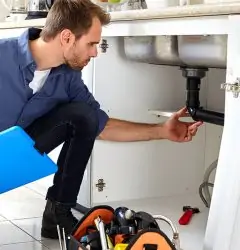14 Sep

All properties that are purchased through the Federal Housing Administration (FHA) loan must undergo an FHA inspection of the property. This inspection is paid for by the buyer of the property and is carried out more thoroughly than a regular appraisal. For an FHA loan to be approved, the property must pass the FHA inspection and appraisal. The FHA loans specially cater to lower-income people and are backed by the government.
What Is An FHA Inspection?
A Federal Housing Administration (FHA) inspection is a thorough inspection that is carried out for any property that involves an FDA loan. The main aim of the inspection is to ensure that the house in question has all the basics required for living, such as electricity, access to clean drinking water, adequate heating facility, fire exits, and a stable roof. This provides the buyer with satisfaction that the house he has purchased is worth the price.
If a house does not meet the FHA requirements, then the buyer is not allowed to purchase that particular house and his loan is not granted. One thing to keep in mind is that the buyer is responsible for paying for the inspection of the house.
A licensed U.S. Department of the Housing and Urban Development (HUD) home appraiser must carry out the FHA inspection. The inspector inspects to ensure that the house meets the minimum requirements of the house in terms of structure, safety, and security.
What Does FHA Look For In An Inspection?
A HUD licensed home appraiser carry out the inspection. His job is to carry out a thorough inspection of the house, to ensure that the house is in a livable condition, and it meets all the basic requirements. Once the FHA inspector is satisfied with the condition of the house, the FHA loan is only then approved. If the FHA inspector does not approve of the house, the FHA does not approve the request for the loan.
During the inspection, the FHA inspector ensures that the house being inspected ticks most boxes, if not all, of the FHA inspection checklist. This checklist is set by the United States Department of Housing and Urban Development (HUD), which must be fulfilled to satisfy the FHA loan requirements. This checklist focuses on the safety, security, and soundness of the house.
What’s The Difference Between FHA Inspection And Appraisal?
The main difference between an FHA inspection and FHA appraisal is that the FHA inspection is a very thorough analysis of the house that helps to determine the condition of the home, whereas the FHA appraisal helps in verifying the value of the house.
The FHA inspection involves the overall inspection of the house to determine the condition of the property being sold. It provides the buyer with great insights into the condition of the property, to help him to make the right buying decision. Generally, FHA inspections are not required for getting an FHA approved mortgage plan.
On the other hand, the FHA appraisal is done by comparing similar properties in the area to the house being bought. This helps to determine the market value of the house. The FHA loan program does require a property appraisal to be conducted by a licensed UHD appraiser. The appraisal is a written thorough assessment of the property, performed during the mortgage approval process.
How Does The FHA Appraisal Work?
The FHA appraisal’s main purpose is to protect the seller by verifying that the selling price of the house is at least worth the home value. A HUD-approved home appraiser, to inspect the whole house and then judge if the house is worth the selling price, conducts this.
Usually, the inspector compares houses recently sold in that area, similar to this one particular house in question, to get an idea of the house value. A house, in the same area, having the same number of bedrooms, bathrooms, and other similar features can be compared to the house being inspected. This helps to give a better market value for the house.
To sum it up, the FHA appraisal helps in determining the value of the property, and if the house meets, the minimum requirements set up by the agency.
The Purpose Of An FHA Appraisal
The purpose of an FHA appraisal includes the following:
Analyzing the site of the property
The appraiser analyzes the site, which includes the location’s topography, the suitability of the soil, encroachments, and other properties adjacent to the area.
Assessing the livability of the house
This includes assessing the above ground and basement areas, the structure and functionality of the property in general. Furthermore, the property is checked for any hazards.
Estimating the market value of the property
The appraiser analyzes similar properties in the area to help determine an estimate for the property being sold.
Evaluating the physical condition of the property
The appraiser does this by documenting all the repairs deemed necessary for the house. He completes the Valuation Conditions (VC) form.
Assessing the longevity of the property
This is important for a long-term mortgage.
How Is The FHA Appraisal Conducted?
The UHD licensed appraiser will inspect the interim and exterior of the house thoroughly, including the surrounding areas as well. While visually inspecting the property, they would be filling out the VC firm, and taking photographs of the areas of the house that may require any improvements, as they would be affecting the value of the property.
Now since we have discussed how the FHA appraisal is conducted, this brings us to the next question- what is the appraiser look for?
The appraiser is generally lookout for:
- Any factors that are affecting the physical condition of the house
- Any factors that could affect the health and safety of the occupants of the house
- Any factors that would affect the livability and marketability of the house
How Long Does An FHA Appraisal Take And How Long Is It Good For?
The FHA appraisal usually takes the same amount of time as a conventional mortgage. The FHA appraisal has a general timeline. This timeline includes:
- The signing of a sales contract between the buyer and seller
- Submitting the contract to the lender by the buyer
- Ordering of the appraisal by the lender
- Market research conducted by the appraiser and then performing the on-site appraisal
- Preparation of the report by the appraiser that is submitted to the lender
The FHA appraisal is good for 120 days. However, it may be extended for 30 days for eligible borrowers.
What Are The FHA Appraisal Requirements?
The FHA Appraisal requires the property in question to meet the minimum property standards set by the HUD department. Once these requirements are met, the FHA loan request can be processed further. Ensuring that these minimum requirements are met helps the buyer to calculate and control the additional costs for extensive damages and repairs.
The FHA requirements can be broadly classified into the following categories:
Safety
The appraiser inspects for any risks that could be associated with the house, for the safety of the occupants. These hazards are associated with:
- The structural integrity of the house
- Electrical installation and utilities
- Lead-based paint and other chemical hazards
- Environmental hazards and health risks associated with the house
Security
The appraiser validates the security of the house by:
- Inspecting the physical and visual condition of the property
- Drainage problems
- Water supply issues
- The condition of the septic tanks
- Road accessibility
Soundness
The appraiser checks for any damages that may require repairs. This includes the inspection of:
- Any pest infestation
- Roof and gutter leaks
- Poor ventilation system
- Any cracks in the floors and walls of the house
- Sinkholes, natural depressions, etc.
The FHA Inspection Checklist
When the FHA inspector is conducting the inspection, they have a checklist to follow, that must be fulfilled. All areas of the house, including the exterior and surroundings of the house, are inspected thoroughly. All the inspection checklists are discussed below.
In Every Room
This checklist applies to all rooms of the house. This checklist includes details about the following:
- The presence of electricity and its condition in every room
- Condition of the windows
- Condition of the ceiling
- Condition of the walls
- Condition of the floors
- Security condition
- Presence of lead-based paint in the house
Bathrooms
All bathrooms in the house are checked for the following:
- Presence of a toilet- it must be in a good working condition, without any leaks
- Presence of a sink- it must be in a good working condition, without any leaks
- Presence or a bathtub or shower- it must be in a good working condition, without any leaks
- Presence of ventilation- it can be an exhaust fan or a window
Kitchen
The kitchen must be inspected for the following:
- Space for food preparation, serving of food, and storage
- All appliances must be working
- The refrigerator must be in a good working condition
- The sink must be functioning properly, without any leaks
- The stove or range with an oven must be in good working condition
Exterior of the Home
The exterior of the house must be inspected thoroughly. The checklist includes details about the following:
- Presence of lead paint on the exterior surfaces
- The swimming pool, if present, must be in good condition, while also adhering to the local ordinances
- Condition of the chimneys
- Condition of the roof and gutters, with a maximum of three layers on top of the roof
- Condition of the siding
- Condition of the porches, stairs, and railings
- Condition of the foundation
Electrical and Heating
The FHA checklist checks for the following:
- There must be no exposed or broken wires in any area and electric boxes
- There must be no fluctuation in any area of the house
- The heating system must be working adequately, and undergo regular maintenance
- Areas with cold winter months must have a fully functional heat source in all the habitable rooms
Water Heaters
The water heater must be in good working condition, with scheduled maintenance being conducted timely. The water heater must adhere to the local building codes and must convey with the property.
General Health and Safety
Certain factors must be checked in the house for the general health ad safety of the occupants. These include the following:
- Checking the stairs and hallways for adequate space and lighting
- Fire exits
- Fully functioning smoke detectors
- Pest infestation
- Presence of any debris or garbage
- Elevators, if present, must be safe and working
- Quality of the interior air
- Refuse disposal
- Presence of any lead-based paint
- Any hazards in the neighborhood or site
Encroachment
The neighbor’s structure must not encroach onto the property you are about to purchase. Similarly, any of your future property structures must not encroach the area of your neighbor’s. Encroachment due to a fence may remain there, as long as it does not have any negative impact on the value of the house.
Roofs and Attics
The roof and attics must be inspected for the following:
- The roofing must be able to keep all moisture out
- There cannot be more than three layers of roofing
- The roofing should be expected to last for at least two more years after the purchase of the house
- In case the FHA appraiser suggests roof repairs, a new roof is required.
- The attic must be inspected for any possible roof problems
Structure
The overall structure of the house should be such that it can keep all its occupants safe. The appraiser must check for the following:
- Severe structural damage
- Dampness in the house or the exterior of the house
- Any leakages
- Any decay
- Any termites
Hazards and Nuisances
These factors are generally seen as hazardous. These include the following:
- Proximity to any explosive material, such as a high-pressure petroleum line
- Proximity to high voltage power lines
- Proximity to a TV transmission tower or radio station
- Proximity to any oil or gas wells located near the house
- Heavy traffic in the area
- Airport noise and hazards
- Other sources of excessive sound, causing noise pollution
- Presence of contaminated soil
The above-mentioned factors are also useful in assessing the location of the property.
Property Access
There must be safe and adequate access for pedestrians and vehicles near the house. The roads around the house must have an all-weather surface, to ensure that the house can be accessed under any weather conditions.
Asbestos
The FHA appraiser inspects age asbestos present in the house. If it is found to be damaged, the FHA appraiser must call for an asbestos professional to inspect the asbestos further.
To sum it up, the FHA appraisal looks for the following:
- Any leakages
- Termites
- Decay
- Any environmental hazards
- Excessive dampness
- Defective construction
- Presence of lead paint
- Functional appliances
- Availability of hot water
- Proper drainage solutions
- Adequate electricity and lighting
- Solid foundation
- Safe sewage disposal
- Availability of safe and potable water with adequate pressure
FHA Inspection Tips
Before the inspection is conducted, it is a great idea to get major damages fixed. Major damages include missing doors, windows, faulty smoke detectors, loose electrical wires, etc. Getting these damages fixed before the inspection would help to speed up the FHA loan process.
What Are the Minimum Property Standards Set By The FHA?
The FHA inspects the property for the health and safety of the occupants. Over the years, the FHA team has become lenient with their inspections. The FHA can still grant loan if the inspectors notice any fixable damages (discussed under the next heading).
However, if there are significant repairs that must be carried out, the FHA loan will not be accepted until the final inspection has been carried out. For example, if the room does not have any windows or doors, the FHA will not process the loan further until these repairs have been made.
The HUD minimum property standards must be met for the FHA loan to pass. The defects that the FHA can overlook have been discussed in the heading below.
What Defects Will The FHA Overlook?
As long as the defects inspected are small and are not hazardous to the occupants in any way, the inspected hazards can be ignored. The FHA does not pay too much emphasis on defects, such as minor cosmetic defects, delayed maintenance schedule, and regular wear and tear. As long as these factors are not detrimental to the safety, security, and soundness of the occupants, these defects will be overlooked.
A few of the defects that the FHA appraiser might overlook include:
- Missing handrails
- Worn out floorings
- Poor paint surfaces in homes completed after 1978
- Poor workmanship
- Damaged windows, doors, countertops, and other features that are still in a working condition
- Minor plumbing leaks
- Damaged plaster, ceiling material in homes constructed after 1978
- Absence of an all-weather driveway surface
The list is not limited to the above-mentioned defects. The FHA might overlook a few other defects, depending on the house condition.
What Will Happen If An FHA Appraisal Comes In Low?
If the FHA appraisal comes in lower than the sale price, the FHA will not insure it. After this, you would be left with three options.
The three options are:
- You can ask the seller to reduce the selling price.
- If the seller refuses to reduce the price, you can walk away.
- You can make up the difference with your funds or through any other form of financing that is available at your disposal. You will end up paying more than the home worth.
Monitor Your FHA Inspections with the Perfect Mobile App
Monitoring and record-keeping of your inspection checklists manually can be very cumbersome. In this digital era, everything is one click away and does not require you to struggle with countless papers. With a user-friendly app, you can ensure that your FHA inspection checklists are updated and comprehensive before this data is provided to the lenders.
EcoDocs provides an all-in-one solution for keeping your FHA inspection checklists. You can generate real-time reports on your mobile devices, without leaving the comfort of your home. This app would help in making the FHA inspection process hassle-free.
Final Thoughts
The FHA inspection checklists help to ensure that the occupants are safe from any hazardous or unsafe conditions associated with the house. Although the FHA home inspection is not a necessity, it is encouraged by the FHA. Your FHA loan is not dependent on the FHA inspection, but you are required to have an appraisal done. To make your life easy, Folio3 has a mobile-friendly app for the proper and hassle-free record keeping of the FHA inspection checklists.




Ecodocs